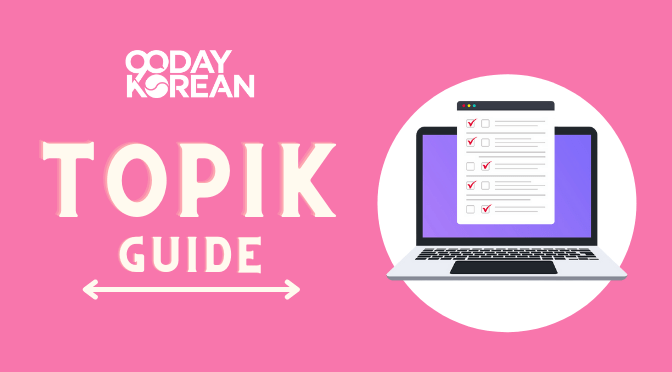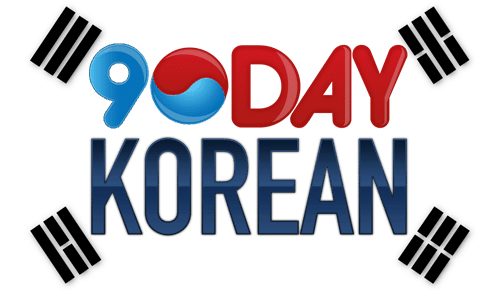Are planning to take the TOPIK?
If you are already somewhat familiar with studying Korean or studying in South Korea as a foreigner, you may have heard the word TOPIK mentioned a few times. But what is that word, exactly? What does it stand for? And is it something you should care about?
In this article, we will go over the TOPIK exam together with you!

What is a TOPIK test?
TOPIK stands for “Test of Proficiency in Korean.” It is an exam offered multiple times a year – six different dates to be precise – for non-native speakers of Korean to test their Korean skills, whatever their level and experience may be. It is administered by the National Institute for International Education, or NIIED for short, which is a branch of the South Korean Ministry of Education.
Korean Proficiency Test
This Korean language proficiency test is especially popular among foreigners wishing to find professional employment in companies in Korea, foreigners who want a residency visa in Korea, bring the family to Korea, and other equivalent reasons.
If you’re an international student, you can even use your TOPIK grades to get into a university in South Korea. Because it takes a few weeks from taking the exam to receive the grades, it is essential to schedule the exam based on when you need to have its scores in hand! Your score for each TOPIK test is valid for two years.
TOPIK Test Format
Previously there were three different levels of TOPIK scores: beginner, intermediate, and advanced. The test consisted of four different sections: grammar and vocabulary, listening, reading, and writing. This was the format of TOPIK until 2014.
A new format has been in effect from the 35th TOPIK test onward, with the exam conducted in July 2014. There are now two levels.
New TOPIK Levels
The Two levels are TOPIK Level 1 and TOPIK Level 2. TOPIK I (or Level 1) is the equivalent of beginner (levels 1 and 2) in the old format, and TOPIK II (or Level 2) covers both intermediate and advanced levels (levels 3 to 6) in the old format.
Now for TOPIK I the test consists of only reading and listening, and TOPIK II has reading, listening, and also writing. However, the grammar and vocabulary section has been eliminated from both.
To reach the higher level in TOPIK I, you are expected to have an understanding of simple daily conversations (both formal and informal), formulate simple sentences, as well as be able to manage some public tasks in your everyday life in Korean. Meanwhile, to get the highest level in TOPIK II, your proficiency is expected to be at a level where you can function in Korean in professional tasks, research environments, comprehend a wide range of ideas and expressions, and be able to understand complex topics such as economics, politics, or topics related to the professional field.
How long is the TOPIK exam?
Excluding the writing portion, TOPIK II is fully a multiple-choice test. TOPIK I lasts for approximately two hours, while TOPIK II with the writing portion takes three hours to complete.
What is a good score on the TOPIK?
Below we’ll tell you the recommended score that you must achieve to pass the different levels.
TOPIK 1 Score
This is the equivalent to the beginner level in the old format
Each segment of the exam is worth 100 points. You need to achieve over 80 points in your test results to pass the exam. You’ll need 140 points in your results to receive level two in the exam
TOPIK 2 Score
The second level covers intermediate and advanced levels in the old format.
You need to achieve at least 120 points in your results to pass TOPIK II. To achieve the highest level in the exam, you should get at least 230 points on your results
How do you register for TOPIK?
If you are in Korea at the time of registering, you can do so at the official site for the exam, where you will also get to choose the location of the exam based on availability. Make sure you check out the official site links regularly for the announcement official date of registration and the form needed. The fee is 35,000WON for TOPIK I and 40,000WON for TOPIK II. You can pay the fee with your debit or credit card, online bank transfer, or an offline direct bank transfer. You’ll also need to include a photo in your application.
If you are in another country overseas, you should visit the local Korean embassies and Korean culture centers to register. Their websites should also show the official announcement on the date of registration and the exam. In addition to the registration fee, which is different one per country, you also need to bring along 2 passport-sized photos.
Whether you are in Korea or a different country overseas, TOPIK is always conducted in person. It is not possible to take the test online at this time.
TOPIK Test Schedule
For the year 2021, the Korean government has released several dates on when the registration will be. If you plan to take the test in your country, you should contact the Korean embassy or those who offer testing assistance services in your area for the exact dates of registration and other information.
However, if you plan to take the test in Korea, you can find the schedules below
Date of Examination – Registration
January – December 8, 2020 – December 14, 2020
April – January 29, 2021 – February 4, 2021
May – March 9, 2021 – March 15, 2021
July – May 21, 2021 – May 27, 2021
October – August 3, 2021 – August 9, 2021
November- September 7, 2021 – September 13, 2021
You can also check out NATIONAL INSTITUTE FOR INTERNATIONAL EDUCATION(NIIED) for more information on TOPIK.
How to prepare for the TOPIK test?
Typically the preparation directly for TOPIK is self-study and practice. Of course, attending a Korean language class, in general, will always help improve your skill and proficiency.
Korean Immigration Integration Program (KIIP)
In South Korea, you can enroll in a language school or the KIIP (Korean immigration integration program) program. KIIP is free to attend, but you will have to take a separate placement exam for it; in fact, most students first take the test and then register for the KIIP program using their average score to be assigned to the proper level. So a full-fledged Korean language school may prove to be a better tool, although KIIP is not as intensive in its course load if you do not have the time to enroll in a language school.
Online Language Course
For the other countries outside of Korea, you may seek out a physical class, or you may utilize many resources online to practice! For example, even our 90DayKorean program can be of great help while preparing to take TOPIK. It is not a prep course for the TOPIK test, but you can learn the fundamentals you’ll need to know for TOPIK. You can access the site wherever through a simple browser or by downloading our application. You can do so in a fun, easy, and stress-free way. This program is best for all levels, from beginners and intermediate or advanced learners.
Books and TOPIK Practice Tests
However, if you are looking to focus your studies specifically on TOPIK, your best bet is to search for books and/or a site with content dedicated to this exam. These items will cover the topics that you may come across while taking TOPIK. A test book is a guide with mock exams based on the exact way the exam is constructed and will help you measure your preparedness for the exam. Also, you may be able to find a site online with old examinations for you to print and try out; some of them are also based on actual exams! These items guarantee results.
What are the best books to prepare for TOPIK?
Because the test can be pretty tricky and test you on topics and materials that are more academic than what you’d need to know in your daily life, you may want to use some TOPIK-specific materials during your preparation for the test, even if you are already attending a Korean class.
You can study the old examinations(and their answers) here. This book for TOPIK I and this book for TOPIK II are some of the most comprehensive books with great content that you can find. In addition to books and a good TOPIK guide, you may want to listen to the Korean language as much as possible through as many different options possible, from dramas to news to prepare for the test.
Should you take TOPIK?
It is up to you and your goals whether you want to take TOPIK! It is available for any Korean learner to take, even those living outside of Korea, to take. There are also multiple test dates to choose from, so the schedule is not an issue. More importantly, it’s also not that expensive. So what do you have to lose if you take it once, even if it’s just for once?
Why should you take TOPIK?
There are multiple reasons you should seriously consider taking TOPIK.
Firstly, a good TOPIK score may help you gain entry to study in a university in Korea. It may also exempt you from taking further language classes before starting your studies. Additionally, once you are in university in South Korea, it is often mandatory to take the TOPIK before graduating.
Additionally, a certificate and a good score from TOPIK will also help you find a job in good Korean companies Korea. And it will also give you points when you apply for a residency visa!
When should you take TOPIK?
If you want to be serious about taking this proficiency test in Korean, you might want to wait until it is time to take it. The test can be pretty difficult and stressful, especially the listening portion. Perhaps you may not want to study hard for it to test yourself.
Now that you know what kind of a test TOPIK is, do you have a schedule to take it? Have you already tried taking TOPIK before, and were you glad about the score you received? If you will take TOPIK soon, what is your motivation to take it? Let us know in the comments!
The post TOPIK – What You Need To Know About this Korean Test appeared first on 90 Day Korean®.
 Learn to read Korean and be having simple conversations, taking taxis and ordering in Korean within a week with our FREE Hangeul Hacks series: http://www.90DayKorean.com/learn
Learn to read Korean and be having simple conversations, taking taxis and ordering in Korean within a week with our FREE Hangeul Hacks series: http://www.90DayKorean.com/learn
Korean lessons * Korean Phrases * Korean Vocabulary * Learn Korean * Learn Korean alphabet * Learn Korean fast * Motivation * Study Korean


Recent comments